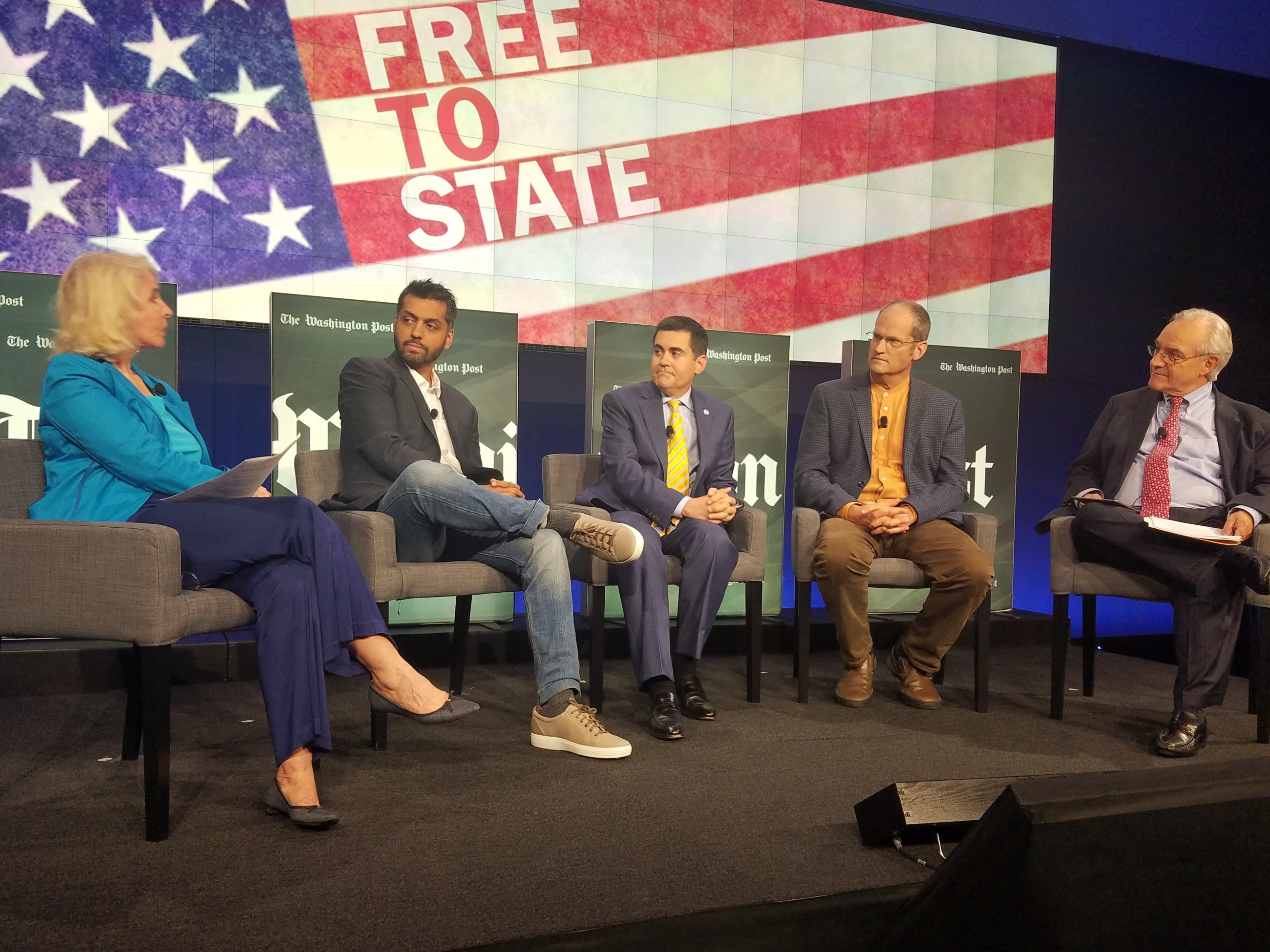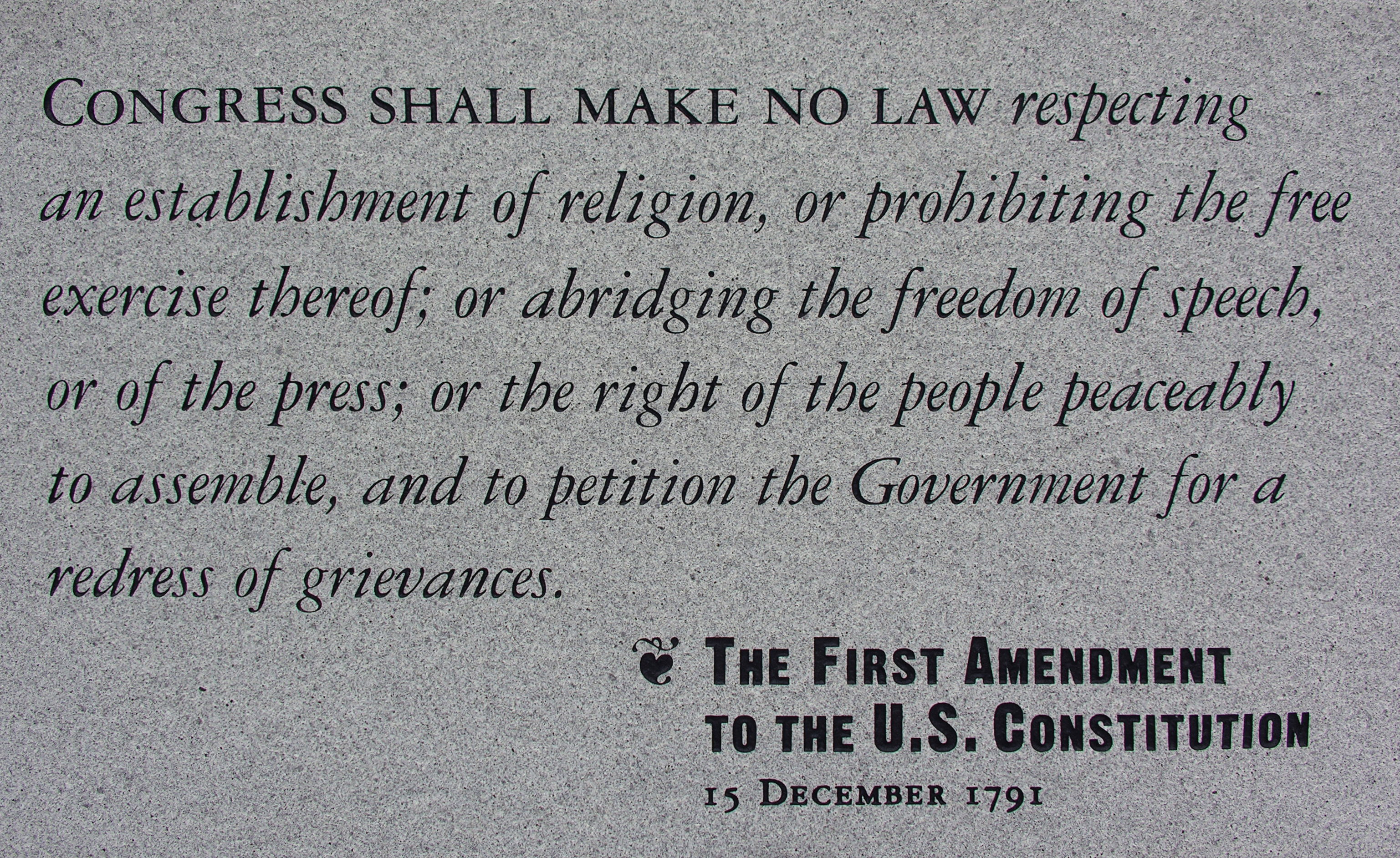
In a digital, diverse America, the First Amendment matters more than ever, forum shows
Is it unconstitutional for President Trump to block his Twitter critics?
Should colleges have so-called safe spaces for students with opposing viewpoints?
Should the United States, as do several other Western democracies, rigorously define and outlaw hate speech?
In the eyes of, say, a brown-skinned American Muslim and an anti-Trump white American evangelical, how protected is the First Amendment’s freedom-of-religion guarantee?
Such questions were unimaginable in 1791, when the nation’s then 14 states—all controlled by white men—ratified the First Amendment as part of the Bill of Rights. But those were among queries about constitutional rights to a free press, free speech and freedom of religion that legal, academic and religious experts considered during Free to State: A New Era for the First Amendment, last week’s Washington Post forum, supported by Knight Foundation.
“It’s fair to see President Trump as a social media president in the same way that JFK was the TV president and FDR was the radio president,” said attorney Jameel Jaffer, founding executive director of the Knight First Amendment Institute.
A Knight Foundation-Columbia University partnership that launched earlier this year in New York, the Institute, in a recent letter to Trump, demanded that he unblock those Twitter critics from @realDonaldTrump.
“President Trump’s Twitter account is a kind of public forum,” Jaffer told the Washington Post audience. “If a government official throws open an environment for expression and uses the environment in the way Trump does … the government can’t, then, exclude people from that based on their viewpoints.”
Also, Jaffer mentioned this month’s U.S. Supreme Court’s ruling that a convicted child molester also had the right to a Facebook account, a sign of the internet’s ever-expanding role as a communications tool. “I suspect there will be many other cases about social media and First Amendment,” Jaffer said.
If Trump ignores the Institute’s demand, he added, “litigation is an option.”
While the expert panelists noted that most Western democracies have legally restricted hate speech, they said they do not favor such constraints in the United States.
Weimar Germany imposed anti-hate speech laws against the Nazis, said longtime First Amendment activist and litigator Floyd Abrams. But being tried for hatemongering crimes got the Nazis “more publicity and it made them better known and it didn’t limit the speech,” Abrams said. “That is one of the lessons of history.”
Ross LaJeunesse, Google’s global head of international relations, also on that panel, said there are inherent dangers to stifling even objectionable speech.
“You’re not doing anything to address the underlying animosity,” LaJeunesse said. “I’m an openly gay man … I’d rather know and not know [what’s being spewed], especially if that person is a government official with the power of the state behind him or her … At least, then, there is an opportunity to engage and try to change hearts and minds—even if you’re not going to be successful at that.”
The presidents of Brown University and the University of Chicago said a lack of understanding of history may, in part, be driving current efforts to silence speakers in classrooms and even to disinvite controversial speakers from campuses. Many of their students arrive on campus never having studied civics or civil discourse, they said.
“The heckling or disruption or arrogating to yourself the right of free speech and eliminating it for someone else … is a problem,” Chicago’s Robert Zimmer said. “Saying that people should be protected from free speech has, in some people’s view, including mine, gotten way out of whack.”
As campuses grapple with free speech, terms such as “safe spaces” and “trigger warnings”—a clinical word usually linked to post-traumatic stress disorder—has sprung up on campuses. That labeling amorphous labeling also can do harm, the educators said.
Brown’s Christina Paxton offered the example of a news reporter last year asking “if we had a safe space in every building. What? What is this supposed to mean? That we have padded cells that are idea-free zones?
“It was kind of funny but it helped me realize that when we talk about safe spaces … it’s just thrown around as insult to campuses or to students without having any clear meaning” attached to it.
In their own ways, people of faith also face the threat of being silenced, forum panelists said. Many liberals view freedom of religion as a partisan issue, rather than a right aimed at preventing government overreach into religious institutions, said Stephen Prothero, Boston University’s religion department chair.
Evangelicals, many of whom are politically conservative, aren’t trying to impose their values on others, said Rev. Dr. Russell Moore, president of the Southern Baptist Convention’s Ethics & Public Policy Commission. Rather, they are demanding freedom to live according their beliefs.
“I’m not looking for a political leader who is using religion to manipulate the masses,” said Moore, who publically opposed Trump during the 2016 campaign. “What I want is a political leader who is able to respect the fact that many of us have different beliefs in this society.”
Attorney Wajahat Ali, whose op-eds have been published by The New York Times, The Gaurdian, Al Jazeera and others, noted that U.S. Muslims do practice their faith but not with the degree of freedom afforded Christians. Nor without being held suspect, including by some on the political left.
“The Christians don’t want us, even though they are for religious liberties—but not our religious liberty,” he said. But practicing Muslims do not automatically find a home on the left. “In order to be seen as liberal and left you have to be what? Secular?”
What’s more, he added, “Muslims, unlike Catholics or Jews, will never be absorbed into whiteness … One of the major fault lines here is race.”
Katti Gray is a freelance writer and editor. For more, visit kattigray.com and follow her on Twitter @KattiGray.
R
-
Journalism / Article
-
Journalism / Article
Recent Content
-
Journalismarticle ·
-
Journalismarticle ·
-
Journalismarticle ·




